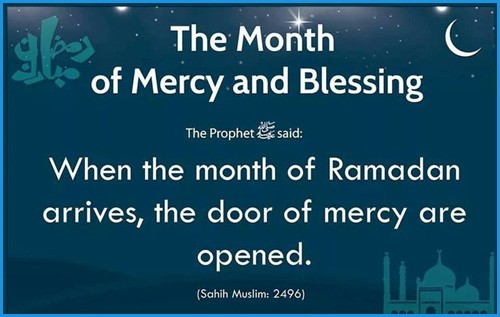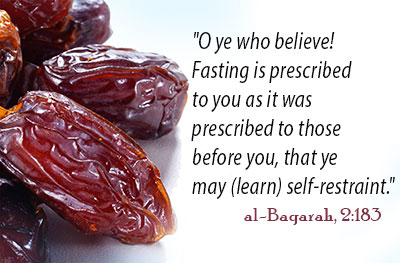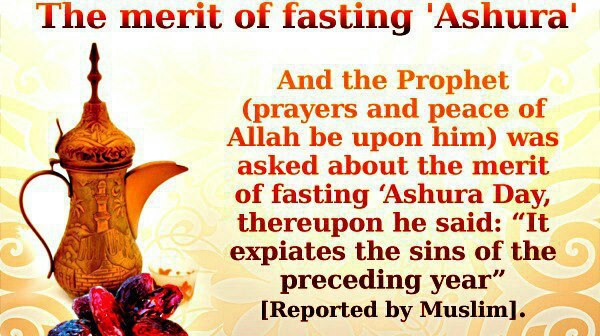Introducing Ramadhan (رمضان)
O believers! Fasting is prescribed for you as it was prescribed for the people before you so that you may become pious. Surah Baqarah (2:183)
The word Ramazaan رمضان is derived from the Arabic root Ramiḍa or ar-ramaḍ, which means scorching heat or dryness.
Hadhrat Hasan Basri (رضي الله عنه) says: When you hear the words: “O believers…,” empty your ears for it as this form of address is to order something or to prohibit something.

The word, “Saam” means to stop. Almighty Allah says in the Holy Quran:
In the terminology of the Shariah, the word, “Saum” means to stop oneself from eating, drinking and having sexual relations and to refrain from sins as well. Almighty Allah says: …as it was prescribed for the people before you…. This shows that fasting was obligated on the earlier nations as well. The first among them was Hadhrat Adam (رضي الله عنه)
‘Abdul Malik bin Haroon narrates from his grandfather, he says: I heard Hadhrat ‘Ali (May Allah be well pleased with him) say: Once, I presented myself before the Holy Prophet (Sallallahu alaihi wa sallam) at midday. He was seated in his house. I greeted Him with Salaam. He returned my greeting and said: O Ali! This Jibreel (May peace be upon him). He greets you with Salaam. I answered: O Prophet of Allah (Sallallahu alaihi wa sallam)! Peace be to you and to him as well.
pleased with him) say: Once, I presented myself before the Holy Prophet (Sallallahu alaihi wa sallam) at midday. He was seated in his house. I greeted Him with Salaam. He returned my greeting and said: O Ali! This Jibreel (May peace be upon him). He greets you with Salaam. I answered: O Prophet of Allah (Sallallahu alaihi wa sallam)! Peace be to you and to him as well.
The Holy Prophet (Sallallahu alaihi wa sallam) said: Come closer to me. I went closer. The Holy Prophet (Sallallahu alaihi wa sallam) said: O ‘Ali! Jibreel tells you to fast for 3 days in a month. For the first day, you will be given the reward of 10,000 years. For the second day, of 30,000 years and for the third day, of 1,00,000 years.
I asked the Holy Prophet (Sallallahu alaihi wa sallam): O Prophet of Allah (Sallallahu alaihi wa sallam)! Is this reward only for me or for everyone? The Holy Prophet (Sallallahu alaihi wa sallam) said: Almighty Allah will grant this reward to you and to everyone after you who does so.
I asked: O Prophet of Allah (Sallallahu alaihi wa sallam)! Which days are those? The Holy Prophet (Sallallahu alaihi wa sallam) said: The 13th, 14th and 15th of every (lunar) month.
These fasts were first obligated on Hadhrat Adam (رضي الله عنه)
Hadhrat Hasan Basri (May Allah shower His mercy on him) and a group of exegetes are of the opinion that by ……….., the Christians are meant. Their fasts are similar to ours and the timing and number are the same. This is such that Almighty Allah obligated the fasts of Ramadhan on the Christians. They resented this as Ramadhan would sometimes come in hot months and sometimes in severe cold because of which they had to bear difficulties in their journeys and their trade activities. Thus, their scholars and leaders agreed that they would fix the fasts in season which came between summer and winter. Thus, they fixed the season of spring for fasting and by way of expiation they increased the days of fasting by 10 days. In this manner their fasting was for 40 days. Then one king of theirs had some ailment of the mouth. He swore that if he is cured of that disease, he would increase the days of fasting by 1 more week. When that king and another came, he ordered that fasts should be for 50 days.

Hadhrat Mujahid (May Allah shower His mercy on him) says that when Christians started dying in great numbers, they increased the fasts even more. Now, they added 10 days in the beginning and 10 days at the end.
The exegetes also say that when the Holy Prophet (ﷺ ) and the Companions emigrated to Madina, Almighty Allah had obligated the fasts of the 10th of Muharram and the fasts of 13th, 14th and 15th of every month on them and they dutifully fasted in those days until a month before the Battle of Badr, the fasting of Ramadhan was decreed. Almighty Allah says: a fixed number of days.. which means that month of Ramadhan is of 29 or 30 days.
It is narrated on the authority of Hadhrat Sa’eed bin ‘Umar bin Sa’eed bin A’as (May Allah be well pleased with them) that he heard from Hadhrat ‘Umar bin Khattab (May Allah be well pleased with him) and he related from the Holy Prophet (ﷺ ) that the Holy Prophet (ﷺ ) said: Me and my Ummah are unlettered, neither calculate nor write down the months. The month of Ramadhan is like this and like this and He gestured thrice with the fingers of His hands.
Meaning of the word “Ramadhan”
There is scholarly disagreement about the meaning of the word, “Ramadhan.” Some say that “Ramadhan” is among the attributes of Almighty Allah.
Hadhrat Imam Ja’afar Sadiq (رضي الله عنه) relates from his illustrious forefathers that the Holy Prophet (ﷺ ) said: Ramadhan is the month of Almighty Allah.
Hadhrat Abu ‘Umar says on the authority of Hadhrat Asma’ee that Ramadhan is called so because in this month, the calves of the camels also get hot.
Some others have said that Ramadhan is called so because the stones are heated up because of the heat of this month. Heated stones are called “Ramadha.” It has also been said that this month is called so because sins are burnt away in this month.
It has been related from the Holy Prophet (ﷺ ) that in this month, the hearts are benefited from advice and the worry of the hereafter the way sand and stones are heated up with the heat of the sun. Khaleel says that this word is derived from, “Ramdharun” and that is the rain which comes in autumn. It is called Ramadhan because this month washes away the sins from the body and purifies the hearts.
The greatness of Ramadhan
Ramadhan is a word of 5 letters.
Ra – The pleasure and approval (Raza) of Almighty Allah.
Meem – The love (Muhabbat) of Almighty Allah.
Zaad – The trust (Zamaanat) of Almighty Allah.
Alif – The affection (Ulfat) of Almighty Allah.
Noon – The radiance (Noor) of Almighty Allah
Thus, this month brings all the aforementioned things for the friends of Almighty Allah and His pious servants.
It has been said that Ramadhan when compared to other months is like the heart in the bosom, the Prophets (May peace be upon him) among common people and the 2 holy cities among all other cities. Dajjaal (the anti-Christ) will be repulsed from the holy cities and Satan is imprisoned in Ramadhan. The Prophets (May peace be upon them) are the intercessors of the sinners and Ramadhan is the intercessor of those who fast. The heart is radiant with the light of gnosis and faith and the month of Ramadhan is radiant with the radiance of the recitation of the Holy Quran.
The one who is not forgiven in Ramadhan will not be forgiven in any other month. Thus, human beings should repent before the doors of repentance are closed forever and should repent before the time of repentance ends and should cry before the time of crying and mercy ends.
The Holy Prophet (ﷺ ) said: As long as my Ummah is mindful of the greatness of Ramazan, it will not be debased.
One person said: O Prophet of Allah ﷺ . What is their debasement? He was told: Any person who does something prohibited in Ramadhan or does any vile act, drinks wine or fornicates, because of this the (deeds of) Ramadhan will not be accepted. Until the next Ramadhan comes, all the angels and the dwellers of the spiritual realm will curse that person and if that person dies before the next Ramadhan, then no good deed of that person will be accepted by Almighty Allah.
Ramadhan – Leader of all months
It has been said that the leader of all men is Hadhrat Adam (May peace be upon him). The leader of all Arabs is Hazrath Muhammad Mustafa (ﷺ ). The leader of all Persians is Hadhrat Salman Farsi (May Allah be well pleased with him). The leader of the Romans is Hadhrat Suhaib Rumi (May Allah be well pleased with him). The leader of the Abyssinians is Hadhrat Bilal (May Allah be well pleased with him) and so on and the leader of all months is the month of Ramadhan.
[Excerpted from Al Ghunya Lit Talibi Tareeqil Haqq]




